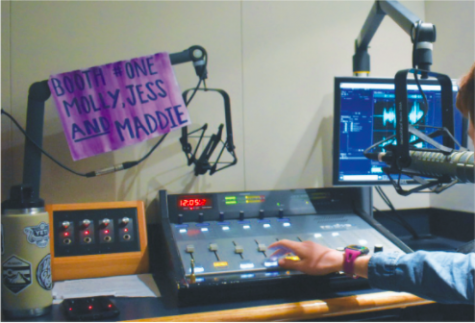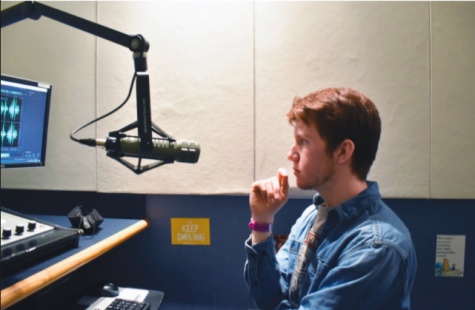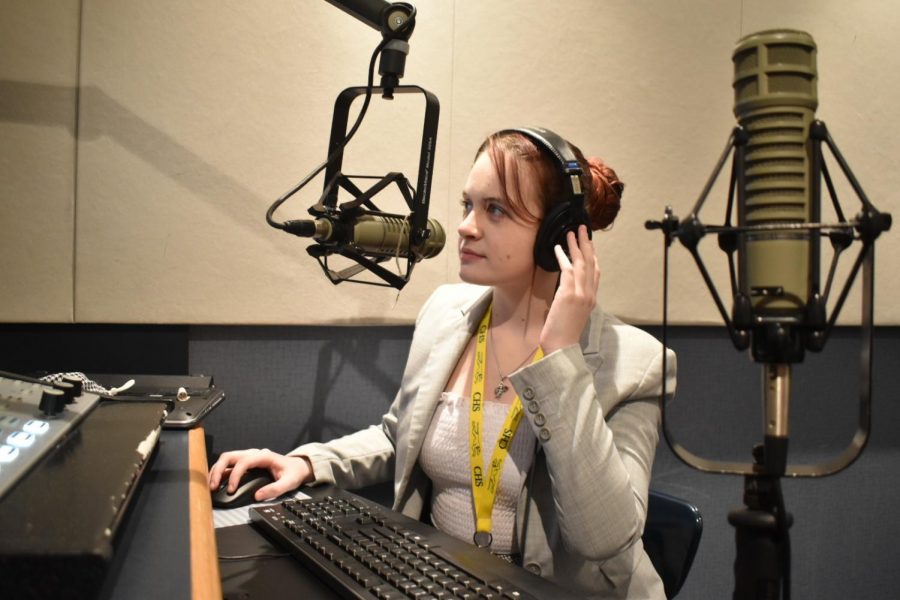Producing podcasts has become a passion for senior Skylar Greaves, a podcast manager and creator for WHJE, and many others as the medium’s viewership has continued to increase steadily over the years.
Since their creation in the early 2000s, podcasts have allowed creators like Greaves to express creativity in a more specific form. And with Radiothon approaching on April 17 and 18, it’s important to take a look into this rising form of production.

Motives for creating podcasts vary from person to person, but Greaves said she enjoys drama podcasting for the freedom aspect. She also explained her love for fictional broadcasting over other more traditional forms of news coverage.
“(Creating a podcast) is really fun and liberating. A lot of people who go into podcasts have a lot of creative expression that is hard to release in other outlets. At least that’s what it was for me and a few of my friends,” Greaves said.
WHJE radio adviser Dominic James said podcasts can allow students to express a greater amount of their creativity and talent.
“(Podcasting) gives people the chance to (talk about) any subject they like,” James said. “Some people are kind of scared by that, but many creative people love the opportunity to do something (like that).”
Both Greaves and James also said the ability to choose from a variety of topics not only appeals to creators, but listeners as well. This thought can be further seen in a study conducted by Pew Research in 2019, where the percentage of podcast listeners increased from 22% in 2009 to 51% in 2019.

Evan Sanders, podcast creator for WHJE and junior, said he thought podcasts allow more freedom for the creator but also allow the listener to multitask and experience a different side of broadcast.
He said, “It doesn’t require a lot of engagement. You can play a podcast while working on homework or going on walks. But also another thing is that, (at least) for more drama-based podcasts, they leave a lot more to the imagination.”
Greaves sided with Sander’s point and said she enjoyed listening to and creating podcasts because of the surrealism of it. She also said she loved reading as a kid, and by using podcasts, similar types of stories can be brought to life in an audible form.
Another large part of why some creators enjoy podcasting is the ability to create a product for WHJE without having to go live.
“Podcasting (requires) a different kind of personality,” James said. “Some people don’t want to do podcasts because it’s too hard and takes too much concentration, whereas many of the podcasters are terrified of doing stuff live on air. So it appeals to different kinds of personalities.”
Greaves agreed, saying, “That’s the main reason I got into podcasting. While I love listening to them, I love to act, but I don’t like to be in front of people. While live shows were fun, I found that I really loved editing the sound effects and the background and the fun voices from the voice acting part.”
Along with being able to express more creativity through podcasts, the satisfaction factor plays a big role also.
“Part of it is the satisfaction of having a finished product. Just having something that you can put out there, point to whenever you’re talking to somebody and say ‘Yeah, I did that,’” Sanders said, “but another part is the journey. From personal experience, I had just finished making a podcast that was about an hour long, and it was an hour long of just editing and it took forever to make; however, it was very gratifying to finish it.”
James added to this idea saying many podcasters are perfectionists. He said while the podcasts take a great amount of time to edit and create, the podcasters will take the time to perfect them because of their personalities.
Aside from all of these motives however, Greaves still said the main drawing factor for her and others is the freedom and expression people can obtain from creating podcasts.
“Just the freedom of it all because you don’t have to do anything specific. Nobody is going to tell you what to do, and it can be about anything you want,” Greaves said. “There aren’t really any rules to it (and) with a podcast you can do whatever you want and talk about whatever you want.”


































![AI in films like "The Brutalist" is convenient, but shouldn’t take priority [opinion]](https://hilite.org/wp-content/uploads/2025/02/catherine-cover-1200x471.jpg)








































![Review: “The Immortal Soul Salvage Yard:” A criminally underrated poetry collection [MUSE]](https://hilite.org/wp-content/uploads/2025/03/71cju6TvqmL._AC_UF10001000_QL80_.jpg)
![Review: "Dog Man" is Unapologetically Chaotic [MUSE]](https://hilite.org/wp-content/uploads/2025/03/dogman-1200x700.jpg)
![Review: "Ne Zha 2": The WeChat family reunion I didn’t know I needed [MUSE]](https://hilite.org/wp-content/uploads/2025/03/unnamed-4.png)
![Review in Print: Maripaz Villar brings a delightfully unique style to the world of WEBTOON [MUSE]](https://hilite.org/wp-content/uploads/2023/12/maripazcover-1200x960.jpg)
![Review: “The Sword of Kaigen” is a masterpiece [MUSE]](https://hilite.org/wp-content/uploads/2023/11/Screenshot-2023-11-26-201051.png)
![Review: Gateron Oil Kings, great linear switches, okay price [MUSE]](https://hilite.org/wp-content/uploads/2023/11/Screenshot-2023-11-26-200553.png)
![Review: “A Haunting in Venice” is a significant improvement from other Agatha Christie adaptations [MUSE]](https://hilite.org/wp-content/uploads/2023/11/e7ee2938a6d422669771bce6d8088521.jpg)
![Review: A Thanksgiving story from elementary school, still just as interesting [MUSE]](https://hilite.org/wp-content/uploads/2023/11/Screenshot-2023-11-26-195514-987x1200.png)
![Review: "When I Fly Towards You", cute, uplifting youth drama [MUSE]](https://hilite.org/wp-content/uploads/2023/09/When-I-Fly-Towards-You-Chinese-drama.png)
![Postcards from Muse: Hawaii Travel Diary [MUSE]](https://hilite.org/wp-content/uploads/2023/09/My-project-1-1200x1200.jpg)
![Review: "Ladybug & Cat Noir: The Movie," departure from original show [MUSE]](https://hilite.org/wp-content/uploads/2023/09/Ladybug__Cat_Noir_-_The_Movie_poster.jpg)
![Review in Print: "Hidden Love" is the cute, uplifting drama everyone needs [MUSE]](https://hilite.org/wp-content/uploads/2023/09/hiddenlovecover-e1693597208225-1030x1200.png)
![Review in Print: "Heartstopper" is the heartwarming queer romance we all need [MUSE]](https://hilite.org/wp-content/uploads/2023/08/museheartstoppercover-1200x654.png)




